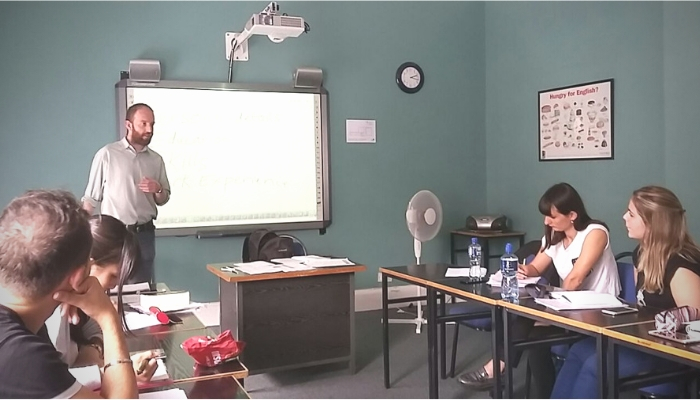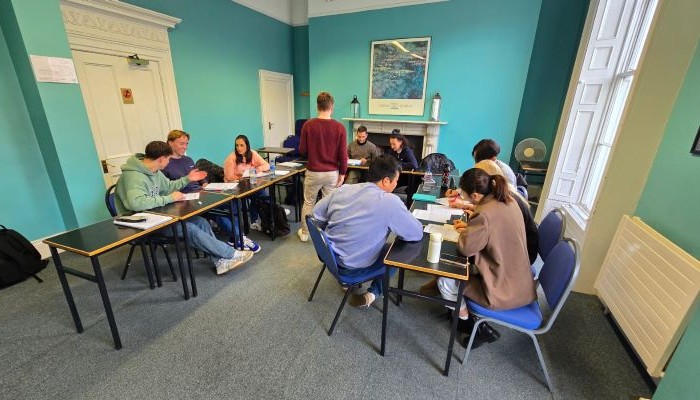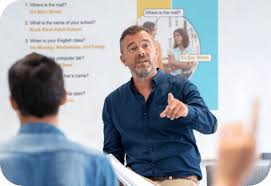- What Are the Best Development Programmes and Tools for Higher Education Professionals?
- Why Professional Development Matters for Higher Education Professionals
- The Role of Erasmus+ in Professional Development
- Key Benefits of Erasmus+ Courses
- Top Professional Development Programmes for Higher Education Professionals
- Best Tools for Higher Education Professionals
- Integrating Critical Thinking, Digital Literacy, and Collaboration Skills in Education Programmes
- Building Emotional and Social Balance in Learners
- Conclusion
What Are the Best Development Programmes and Tools for Higher Education Professionals?

In an era of rapid technological advancement and evolving educational landscapes, higher education professionals face an ever-growing need to continuously upskill and adapt. Staying current with best practices, digital innovations, and emerging educational paradigms is crucial for fostering student success. This blog explores top development programmes and tools available for vocational and university-level educators. We will also examine actionable strategies for integrating critical thinking, digital literacy, and collaboration skills into educational programmes.
Why Professional Development Matters for Higher Education Professionals
Professional development empowers educators to:
- Stay updated on educational trends and technology.
- Foster a more engaging and inclusive learning environment.
- Enhance their teaching, assessment, and research skills.
- Build networks and collaborate with peers from across Europe.
The Role of Erasmus+ in Professional Development
One of the most impactful initiatives for European educators is the Erasmus+ programme. This EU-funded initiative supports education, training, youth, and sport in Europe. Higher education professionals can benefit from:
- Staff Mobility Grants: Participate in training and job-shadowing opportunities abroad.
- Collaborative Projects: Engage in research and innovation projects with partner institutions.
Key Benefits of Erasmus+ Courses

- Fully accredited by the European Union.
- Courses eligible for EU funding.
- Opportunities to learn in diverse cultural environments.
- Comprehensive support during the application process, including necessary documentation.
Learn more about our Erasmus+ Courses at our accredited centres in Dublin, Cork and Galway
Top Professional Development Programmes for Higher Education Professionals
1. Erasmus+ Staff Mobility Programmes
Erasmus+ courses are tailored to meet the needs of educators and include topics such as:
- Innovative teaching methodologies.
- Digital education strategies.
- Classroom management and inclusivity.
- Developing leadership skills.

2. Digital Learning Platforms
In today’s digital age, online learning platforms are indispensable tools for educators. Some recommended platforms include:
- Coursera: Offers courses from top universities and companies worldwide.
https://www.coursera.org/) - edX: Provides free courses from leading institutions. (https://www.edx.org/)
- FutureLearn: Focuses on career development and innovative education. (https://www.futurelearn.com/)
- LinkedIn Learning: A robust platform for upskilling in digital and professional skills. (https://www.linkedin.com/learning/)
3. Pedagogical Innovation Workshops
Workshops focused on innovative pedagogy help educators improve their teaching strategies. Topics often include:
- Active learning techniques.
- Project-based learning.
- Gamification in education.
4. Conferences and Networking Events
Attending international conferences offers invaluable opportunities to:
- Present research findings.
- Discover the latest educational trends.
- Build partnerships with other educational institutions.
Examples of notable conferences:
- European Conference on Educational Research (ECER) (https://eera-ecer.de/conferences/ecer-2025-belgrade)
- EDUCAUSE Annual Conference (https://www.educause.edu/conferences-events)
- IATEFL (https://www.iatefl.org/)
5. Educational Research and Development Programmes
Participating in research initiatives enhances professional knowledge and contributes to institutional growth. Look for programmes that offer research grants or collaborative opportunities.
Best Tools for Higher Education Professionals
1. Learning Management Systems (LMS)
A robust LMS helps educators manage content, assess learners, and facilitate collaboration. Some popular choices include:
- Moodle: Open-source and customizable.
- Canvas: User-friendly and scalable.
- Blackboard: Comprehensive features for higher education institutions.
2. Collaboration Tools
Facilitating collaboration between educators and students is essential for modern learning environments.

- Microsoft Teams: Ideal for communication and project management.
- Slack: Streamlines communication for educational teams.
- Google Workspace: Offers tools for document sharing and collaboration.
3. Assessment and Feedback Tools
Effective assessment tools help educators gauge student progress.
- Kahoot!: Gamified quizzes for engaging assessments.
- Mentimeter: Interactive polls and quizzes.
- Turnitin: Ensures academic integrity and improves writing skills.
4. Digital Content Creation Tools
Creating engaging digital content is crucial for modern education.
- Canva: Design presentations and visual content.
- Prezi: Create dynamic and interactive presentations.
- Adobe Spark: Easy multimedia content creation.
5. Data Analytics Tools
Tracking and analyzing student data helps educators improve outcomes.
- Tableau: Visualizes data trends.
- Google Analytics: Tracks website engagement.
- Power BI: Data visualization and analysis tool.
Integrating Critical Thinking, Digital Literacy, and Collaboration Skills in Education Programmes
- To prepare students for a dynamic world, educators must foster critical thinking, digital literacy, and collaboration skills. Here are actionable strategies that can be embedded into any curriculum to nurture well-rounded, future-ready graduates:
Critical Thinking
- Encouraging critical thinking helps students approach challenges with curiosity, creativity, and resilience. Educators can embed this skill by:
- Case Studies: Present students with complex, real-world scenarios that require analytical thinking and creative problem-solving. These exercises foster the ability to weigh evidence, draw conclusions, and suggest solutions.
- Socratic Questioning: Engage students with open-ended, probing questions that encourage deep reflection, logical reasoning, and the ability to defend viewpoints.
- Debate Sessions: Facilitate structured debates on relevant topics, helping students sharpen their ability to consider diverse perspectives, practice respectful discourse, and articulate coherent arguments.
- Reflective Journals: Encourage students to keep journals that prompt them to analyze their learning journey, evaluate their assumptions, and develop metacognitive skills.
- Problem-Based Learning: Introduce real-world problems as the central focus of lessons to cultivate independent thought and teamwork.
Digital Literacy
- Digital literacy is fundamental for students to participate fully in the digital economy and civic life. Institutions should consider:
- Media Literacy: Guide students in critically assessing the reliability, bias, and purpose of digital media sources, strengthening their ability to distinguish fact from misinformation.
- Coding and Data Literacy: Encourage introductory coding and data analysis projects to help students understand the logic and structure behind digital systems.
- Digital Citizenship: Promote responsible, respectful, and constructive interaction in digital environments, fostering awareness of digital rights and responsibilities.
Collaboration Skills
- Effective collaboration is at the heart of academic and professional success. Educators can nurture this by creating structured opportunities for teamwork and communication:
- Group Projects: Design multi-phase assignments where students work together to research, plan, and present solutions, thereby developing negotiation, delegation, and leadership skills.
- Peer Reviews: Establish feedback cycles where students evaluate each other’s work, fostering critical analysis and an appreciation for diverse viewpoints.
- Interdisciplinary Collaboration: Facilitate projects that bring together students from different departments or academic backgrounds, encouraging them to apply diverse knowledge and approaches to solve common problems.
- International Virtual Exchanges: Utilize digital platforms to connect students with peers from other countries, promoting intercultural communication and global collaboration skills.
Building Emotional and Social Balance in Learners
In addition to academic excellence, fostering emotional and social balance is essential for student development. A well-rounded education equips learners not only with intellectual tools but also with emotional intelligence and interpersonal resilience—qualities essential for thriving in today’s interconnected world.
Strategies for Educators
- Mindfulness Practices: Integrate brief mindfulness exercises, such as guided breathing, body scans, or quiet reflection moments, into the daily classroom routine to reduce stress and improve focus.
- Positive Reinforcement: Foster a growth mindset by recognizing and celebrating students’ efforts and progress, rather than focusing solely on outcomes. Acknowledging both big and small achievements builds confidence and motivation.
- Role-Modeling Emotional Balance: Educators can model appropriate ways of managing stress and emotions, helping students learn through observation and interaction.
- Restorative Practices: Instead of punitive measures, apply restorative circles and dialogue to resolve conflicts and misunderstandings, reinforcing mutual respect and accountability within the classroom community.
Creating Supportive Learning Environments
- Inclusive Classrooms: Design lesson plans and activities that respect cultural, linguistic, and cognitive diversity. Create a classroom culture where every student feels seen, heard, and valued.
- Mental Health Resources: Collaborate with school counseling services and ensure students are aware of mental health support channels. Normalize discussions around mental health and advocate for proactive emotional support.
- Safe Physical and Digital Spaces: Create both in-person and online environments where students feel emotionally secure, free from bullying, discrimination, or harassment, allowing them to focus fully on learning and growth.
Conclusion
Higher education professionals play a pivotal role in shaping the future of learners. By participating in development programmes and leveraging advanced tools, educators can enhance their teaching practices and contribute to student success. Erasmus+ offers invaluable opportunities for professional growth, while integrating critical thinking, digital literacy, and collaboration skills ensures that students are well-prepared for the challenges of tomorrow. Embracing these strategies will empower educators to create impactful learning experiences and foster a balanced, inclusive educational environment.
